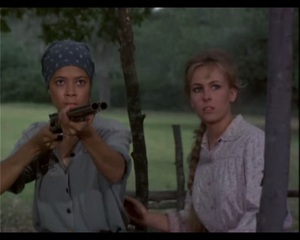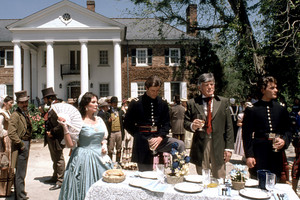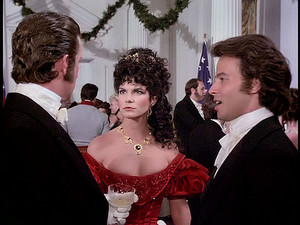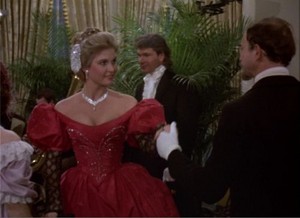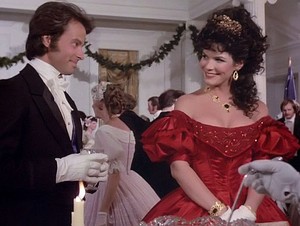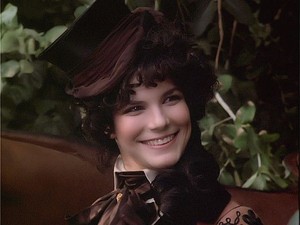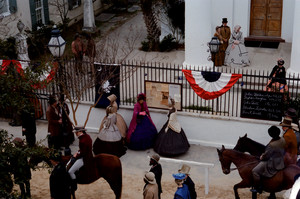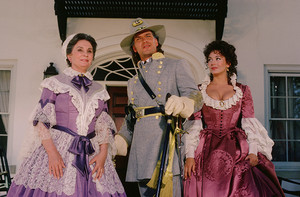"NORTH AND SOUTH: BOOK II" (1986) - EPISODE FIVE "December 1864 - February 1865" Commentary
"NORTH AND SOUTH: BOOK II" finally reached its home stretch in Episode Five, the penultimate episode. Well . . . almost. Beginning several weeks after the end of Episode Four, Episode Five continued the miniseries' portrayal of the Civil War's last year for the Hazards and the Mains. It also put three or four subplots to rest.
Episode Five opened with George Hazard still imprisoned inside Libby Prison in Richmond, Virginia. The episode also continued with Madeline Main's efforts to feed Charleston's poor and war refugees, Charles Main and Augusta Barclay's wartime romance, and the survival of Mont Royal's remaining inhabitants. Episode Five also closed several subplots that included Stanley and Isobel Hazard's war profiteering, Elkhannah Bent and Ashton Main Huntoon's plot against Jefferson Davis' administration, and Madeline's relationship with former officer Rafe Beaudine.
This episode featured some excellent dramatic moments. Lewis Smith certainly shined in his portrayal of Charles Main, who had hardened considerably after three-and-a-half years of war. This was especially apparent in scenes that included Charles' reluctance to help his cousin Orry Main rescue George Hazard from Libby Prison, his cold-blooded killing of a Union prisoner, his attempt prevent fellow scout Jim Pickles from deserting and his emotionally distant attitude toward lady love Augusta Barclay and her manservant, Washington. Another well acted scene featured Brett Main Hazard and Semiramis' encounter with former Mont Royal overseer, Salem Jones. Watching Erica Gimpel point a shotgun at Tony Frank, considering their characters' past history, brought a smile to my face. I also enjoyed the poignant scene between Brett and her mother, Clarissa Main, while the latter painfully reminisced about the past; thanks to Genie Francis and Jean Simmons' performances. And both James Read and Jonathan Frakes knocked it out of the ballpark in the scene that featured George's confrontation with Stanley and Isobel over their war profiteering. They were supported by fine performances from Wendy Kilbourne and Mary Crosby.
But another truly superb performance came from Terri Garber, who got a chance to portray Ashton Huntooon's increasing doubts over Elkhannah Bent's scheme against Davis. This was especially apparent in one scene in which Ashton silently expressed shame over her willingness to prostitute herself to a potential contributor for Bent's plot. She received fine support from Jim Metzler as her husband James Huntoon and Patrick Swayze as Orry Main. But I felt that Philip Casnoff's Bent nearly became slightly hammy by the scene's end. Even Lesley Anne Down and Lee Horsley managed to shine as Madeline and the infatuated Rafe Beaudine. But I must admit that I found one of their later scenes slightly melodramatic.
Yet, despite these dramatic gems, I was not particularly impressed by the writing featured in Episode Five. I had a problem with several subplots. One, I had a problem with the subplot involving Stanley and Isobel's profiteering. It made me wish the screenwriters had adhered to author John Jakes' original portrayal of the couple in his 1984 novel, "Love and War". I felt this subplot had ended with a whimper. It was bad enough that George had killed Stanley and Isobel's partner in a bar fight. But aside from the dead partner, the only way the couple could face conviction was to confess. And I found it implausible that a remorseful Stanley would still be willing to do that after receiving an earful of angry insults from George. Very weak.
Episode Five also allowed Madeline and Bent's subplots to interact for the purpose of killing off Rafe Beaudine. Frankly, I found the idea of Bent traveling from Richmond to Charleston for more funds . . . only to be told to seek hard cash from "the Angel of Charleston" - namely Madeline. The latter recruited a retired stage actress portrayed by Linda Evans to impersonate her and discover Bent's plans. And what was Madeline's next act? She left her boarding house (in the middle of the night) to warn . . . who? The script never made it clear about whom Madeline had intended to warn. Why? Because her night time task was interrupted by Bent, who had recognized the stage actress. And before Bent could lay eyes upon Madeline, Rafe comes to her rescue. What can I say? Contrived.
I also found Bent's scheme to get rid of Jefferson Davis and assume political and military control of the Confederacy rather ludicrous. Audiences never really saw him recruit any real political support for his scheme . . . just money from various wealthy Southerners. The screenplay never allowed Bent to make any effort to recruit military support for the weapons he had purchased. In the end, I found the entire subplot lame and a waste of my time.
And finally, we come to the efforts of "Madeline the Merciful" to find food for Charleston's poor. Personally, I found this subplot simply ludicrous. Madeline did not bother to recruit other women from Charleston's elite to help her. And I suspect some of them would have been willing to help. I also found this subplot extremely patronizing. Again, it seemed to embrace the "savior complex" trope to the extreme. The subplot seemed to infantilize all social groups that were not part of the city's white elite or middle-class - namely fugitive slaves, working-class whites and all free blacks. I found this last category surprising, considering that the screenwriters failed to acknowledge that not all free blacks were poor. In the end, this entire subplot struck me as a white elitist fantasy that Julian Fellowes would embrace.
The production values featured in the episode struck me as top-notch. Both director Kevin O'Connor and the film editing team did excellent work for the actions scenes in Episode Five. I found myself impressed by the scenes that featured George's escape from Libby Prison, his bar fight with Stanley and Isobel's profiteering partner, Bent and Rafe's fight in Charleston and the former's encounter with Orry and the Huntoons back in Virginia. More importantly, Robert Fletcher continued to shine with his outstanding costume designs.
Yes, Episode Five featured some fine dramatic moments and performances. It even featured some solid action scenes. But . . . I was not particularly happy with most of the subplots. I also found the ending of one particularly subplot rather disappointing. No one felt more relieved than me when Episode Five finally ended.
"NORTH AND SOUTH: BOOK II" finally reached its home stretch in Episode Five, the penultimate episode. Well . . . almost. Beginning several weeks after the end of Episode Four, Episode Five continued the miniseries' portrayal of the Civil War's last year for the Hazards and the Mains. It also put three or four subplots to rest.
Episode Five opened with George Hazard still imprisoned inside Libby Prison in Richmond, Virginia. The episode also continued with Madeline Main's efforts to feed Charleston's poor and war refugees, Charles Main and Augusta Barclay's wartime romance, and the survival of Mont Royal's remaining inhabitants. Episode Five also closed several subplots that included Stanley and Isobel Hazard's war profiteering, Elkhannah Bent and Ashton Main Huntoon's plot against Jefferson Davis' administration, and Madeline's relationship with former officer Rafe Beaudine.
This episode featured some excellent dramatic moments. Lewis Smith certainly shined in his portrayal of Charles Main, who had hardened considerably after three-and-a-half years of war. This was especially apparent in scenes that included Charles' reluctance to help his cousin Orry Main rescue George Hazard from Libby Prison, his cold-blooded killing of a Union prisoner, his attempt prevent fellow scout Jim Pickles from deserting and his emotionally distant attitude toward lady love Augusta Barclay and her manservant, Washington. Another well acted scene featured Brett Main Hazard and Semiramis' encounter with former Mont Royal overseer, Salem Jones. Watching Erica Gimpel point a shotgun at Tony Frank, considering their characters' past history, brought a smile to my face. I also enjoyed the poignant scene between Brett and her mother, Clarissa Main, while the latter painfully reminisced about the past; thanks to Genie Francis and Jean Simmons' performances. And both James Read and Jonathan Frakes knocked it out of the ballpark in the scene that featured George's confrontation with Stanley and Isobel over their war profiteering. They were supported by fine performances from Wendy Kilbourne and Mary Crosby.
But another truly superb performance came from Terri Garber, who got a chance to portray Ashton Huntooon's increasing doubts over Elkhannah Bent's scheme against Davis. This was especially apparent in one scene in which Ashton silently expressed shame over her willingness to prostitute herself to a potential contributor for Bent's plot. She received fine support from Jim Metzler as her husband James Huntoon and Patrick Swayze as Orry Main. But I felt that Philip Casnoff's Bent nearly became slightly hammy by the scene's end. Even Lesley Anne Down and Lee Horsley managed to shine as Madeline and the infatuated Rafe Beaudine. But I must admit that I found one of their later scenes slightly melodramatic.
Yet, despite these dramatic gems, I was not particularly impressed by the writing featured in Episode Five. I had a problem with several subplots. One, I had a problem with the subplot involving Stanley and Isobel's profiteering. It made me wish the screenwriters had adhered to author John Jakes' original portrayal of the couple in his 1984 novel, "Love and War". I felt this subplot had ended with a whimper. It was bad enough that George had killed Stanley and Isobel's partner in a bar fight. But aside from the dead partner, the only way the couple could face conviction was to confess. And I found it implausible that a remorseful Stanley would still be willing to do that after receiving an earful of angry insults from George. Very weak.
Episode Five also allowed Madeline and Bent's subplots to interact for the purpose of killing off Rafe Beaudine. Frankly, I found the idea of Bent traveling from Richmond to Charleston for more funds . . . only to be told to seek hard cash from "the Angel of Charleston" - namely Madeline. The latter recruited a retired stage actress portrayed by Linda Evans to impersonate her and discover Bent's plans. And what was Madeline's next act? She left her boarding house (in the middle of the night) to warn . . . who? The script never made it clear about whom Madeline had intended to warn. Why? Because her night time task was interrupted by Bent, who had recognized the stage actress. And before Bent could lay eyes upon Madeline, Rafe comes to her rescue. What can I say? Contrived.
I also found Bent's scheme to get rid of Jefferson Davis and assume political and military control of the Confederacy rather ludicrous. Audiences never really saw him recruit any real political support for his scheme . . . just money from various wealthy Southerners. The screenplay never allowed Bent to make any effort to recruit military support for the weapons he had purchased. In the end, I found the entire subplot lame and a waste of my time.
And finally, we come to the efforts of "Madeline the Merciful" to find food for Charleston's poor. Personally, I found this subplot simply ludicrous. Madeline did not bother to recruit other women from Charleston's elite to help her. And I suspect some of them would have been willing to help. I also found this subplot extremely patronizing. Again, it seemed to embrace the "savior complex" trope to the extreme. The subplot seemed to infantilize all social groups that were not part of the city's white elite or middle-class - namely fugitive slaves, working-class whites and all free blacks. I found this last category surprising, considering that the screenwriters failed to acknowledge that not all free blacks were poor. In the end, this entire subplot struck me as a white elitist fantasy that Julian Fellowes would embrace.
The production values featured in the episode struck me as top-notch. Both director Kevin O'Connor and the film editing team did excellent work for the actions scenes in Episode Five. I found myself impressed by the scenes that featured George's escape from Libby Prison, his bar fight with Stanley and Isobel's profiteering partner, Bent and Rafe's fight in Charleston and the former's encounter with Orry and the Huntoons back in Virginia. More importantly, Robert Fletcher continued to shine with his outstanding costume designs.
Yes, Episode Five featured some fine dramatic moments and performances. It even featured some solid action scenes. But . . . I was not particularly happy with most of the subplots. I also found the ending of one particularly subplot rather disappointing. No one felt more relieved than me when Episode Five finally ended.


